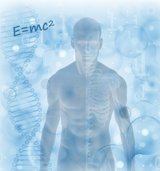Health and Wellness
Why You Care About Vitamin D
For many, winter season often raises concerns about vitamin D (the "sunshine vitamin"). Interest in vitamin D has grown in recent years and for sure during the pandemic.
Vitamin D deficiency is a global public health issue. It is estimated that nearly 3 billion people suffer from vitamin D deficiency across the world, while 50% of the population has vitamin D insufficiency.
Around 75-80% of Americans are deficient in this important vitamin!
With the discovery of vitamin D receptors in tissues other than the gut and bone—especially the brain, breast, prostate, and lymphocytes—and the recent research suggesting that higher vitamin D levels provide protection from various diseases. Including diseases such as diabetes mellitus, osteoporosis, osteoarthritis, hypertension, cardiovascular disease, metabolic syndrome, depression, several autoimmune diseases, and cancers of the breast, prostate, and colon, we can now utilize vitamin D for a wider range of preventive and therapeutic applications to maintain and improve our clients’ health.
What is Vitamin D?
Vitamin D is technically not a vitamin because humans have the capacity to produce it themselves through exposure to sunlight. Vitamin D is biologically inert and must undergo two chemical processes in the body for activation. The first occurs in the liver and converts vitamin D to a prehormone called calcidiol. The second occurs primarily in the kidney and forms the physiologically active hormone calcitriol. Consequently, when we don’t get enough vitamin D, we will not have enough calcitriol inside our tissues (e.g. prostate, breast, colon etc.), and not having enough of a hormone can be very bad news.
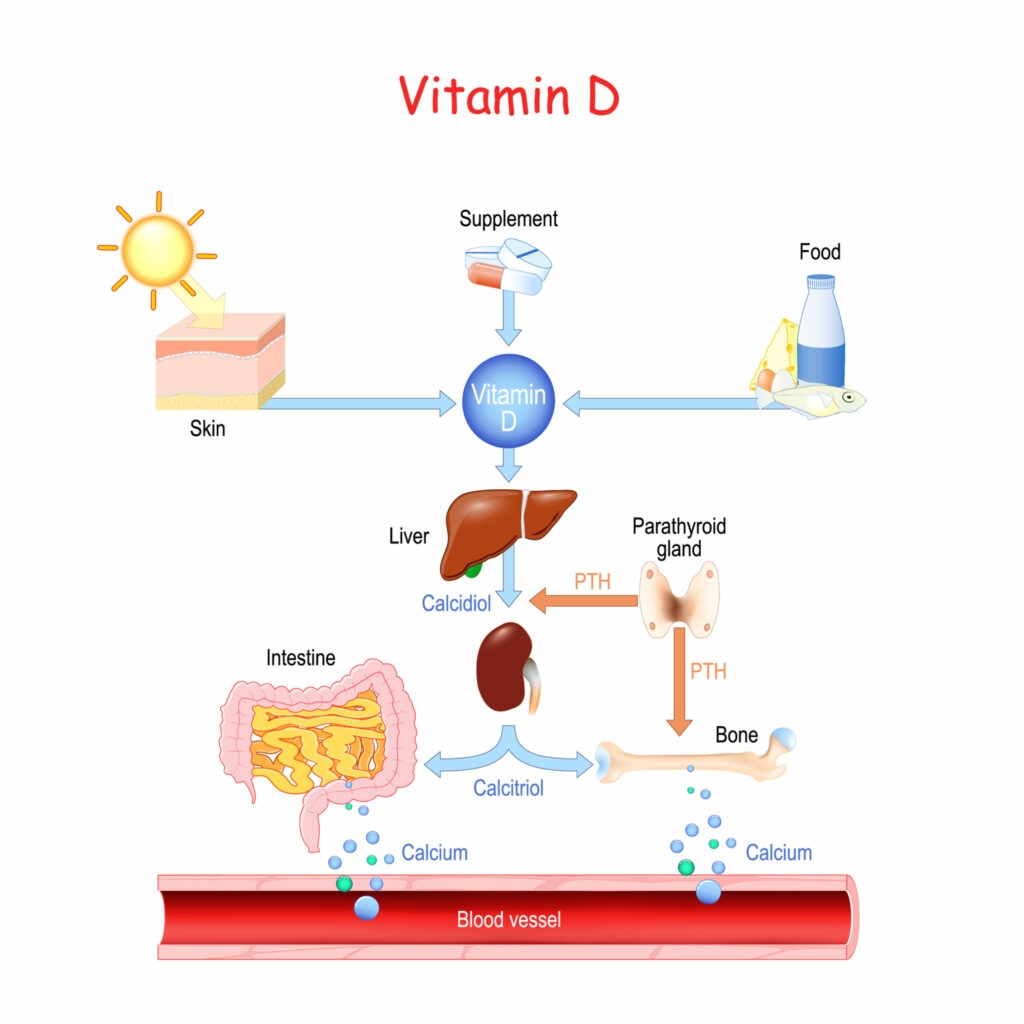
Vitamin D is important for bone health. For example, vitamin D deficiency causes rickets in children and osteomalacia or osteoporosis in adults. Further, vitamin D does have many non-bone functions in the body. Indeed, evidence is accumulating that vitamin D is important in prevention and treatment of a range of conditions including asthma, heart failure, and autoimmune diseases, such as multiple sclerosis and inflammatory bowel disease (Crohn’s disease, ulcerative colitis).
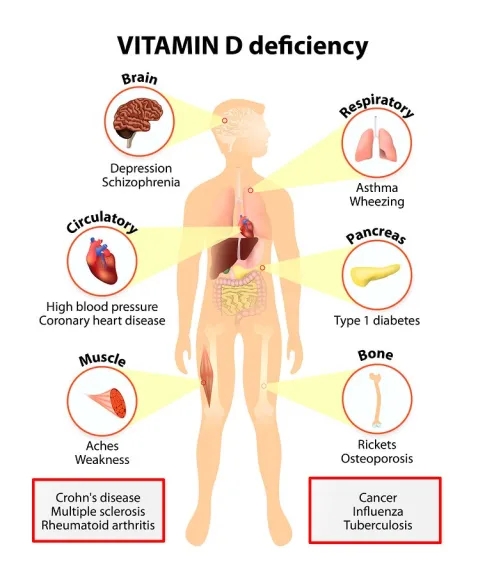
Why is Vitamin D so important?
Vitamin D plays a crucial role in many body functions and therefore in overall health and well-being.
Vitamin D plays a central role in modulating your immune system, muscle function, cardiovascular and respiratory health as well as brain development.
Once activated, vitamin D works by managing calcium in your blood, bones and gut.
Benefits of Vitamin D
- Immunoregulatory as manifested by its ability to reduce inflammation
- Modulates neurotransmitters and therefore has antidepressant and anti-convulsant benefits
- Suppress and/or prevent certain autoimmune diseases
- Reduce the risk of cancer development
- Reduce the severity and frequency of infectious diseases, such as pneumonia and influenza
- Promotes bone health
- Prevents cognitive decline
- Reduces musculoskeletal pain
- Prevents endometriosis and PCOS
- Improves chronic fatigue
- Reduces suffering by alleviating the morbidity and mortality associated with hypertension, epilepsy, migraine, diabetes, and cardiovascular disease
- Overall supports general health
Vitamin D and the Immune system
Vitamin D3 is an immunomodulator targeting various immune cells, including monocytes, macrophages, dendritic cells, as well as T-lymphocytes and B-lymphocytes. Several epidemiological studies have linked inadequate vitamin D levels to a higher susceptibility of immune-mediated disorders including chronic infections and autoimmune diseases.
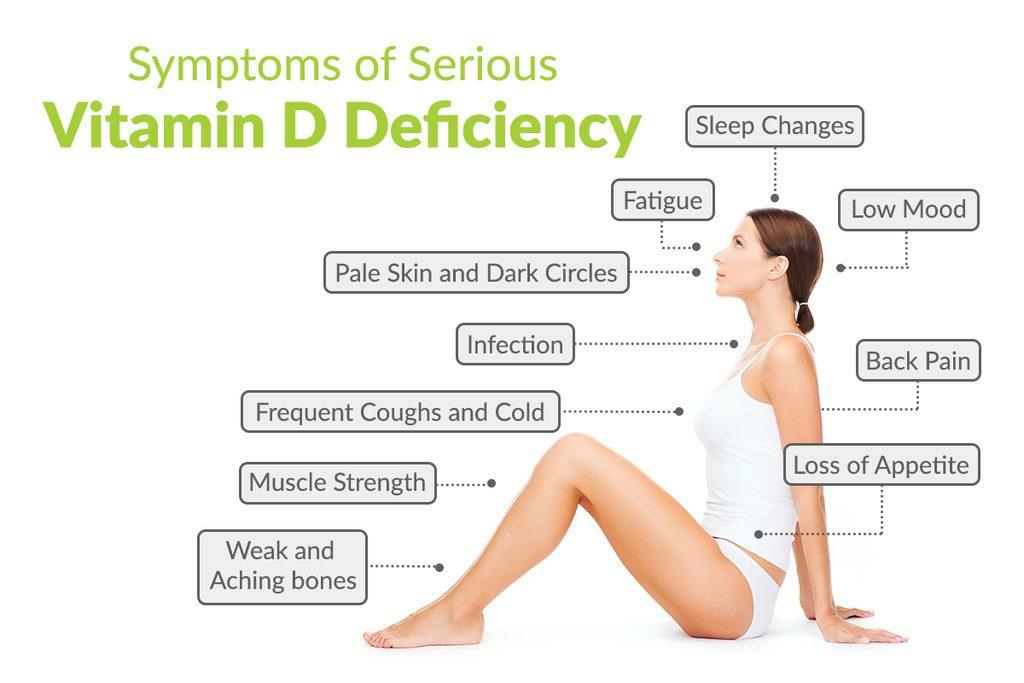
What causes inadequate Vitamin D levels?
Inadequate sun exposure
The major factor for vitamin D deficiency is insufficient sun exposure. Geographical location, specifically latitude (distance from the equator) has a major influence on vitamin D levels. The further we are from the equator, the lower the strength of the sun and the lower our potential to produce vitamin D. Season is also important. In the summer, the sun is higher in the sky, which means less UV radiation is filtered by the atmosphere, and the daytimes are longer. Certain parts of the US are exposed to sun strong enough to produce good quantities of vitamin D year-round (e.g. Miami) while places like New York do not get strong enough sun for about four months (November to February). Some cities further north than New York (e.g. Boston) do not get strong enough sun for about six months (October to March).
The “Shadow Rule”
Kerley’s shadow rule: if your shadow is shorter than your body, you can be making vitamin D (as long as you’re in the sun and not covered head to toe in either clothes or sunscreen). If your shadow is longer than your body, you’re probably not making vitamin D, regardless of how sunny or warm it is and how much sunscreen or clothes you’re wearing.
Avoid burning at all costs. Each person’s skin is different. There is no evidence that moderate sun is harmful and may even be beneficial but there is consistent evidence that sunburns are associated with skin damage.
Sunscreen use
Excessive use of sunscreen may prevent the entry of beneficial wavelengths of the sun rays into the deeper layers of the skin due to which the vitamin D synthesis can get affected.
Insufficient intake in the diet
Vitamin D can also be obtained via the diet and therefore lack of Vitamin D rich foods can also play a role in deficiencies. The best food sources of vitamin D are egg yolks, mushrooms, fatty fish, liver, and grass-fed cheese and butter.
This also suggests why vitamin D deficiency tends to be more common in vegetarians and vegans. It is advisable to include the vegetarian sources of vitamin D in the diet or use vitamin D supplements in order to avoid the deficiency of this nutrient in vegans and vegetarians.
Underlying liver & kidney pathology
People who suffer from liver or kidneys disorders are likely to develop vitamin D deficiency. The inefficient functioning of these vital organs can hamper the normal physiological processes involved in vitamin D synthesis and thus, lead to the deficiency in spite of adequate dietary intake and sun exposure.
Malabsorption conditions
People who suffer from digestive issues that cause malabsorption of food in the intestine such as celiac disease, inflammatory bowel diseases, or pancreatic insufficiency are likely to develop vitamin D deficiency.
These diseases can reduce the absorption of calcium in the body due to which vitamin D would remain under-utilized. As a result, people may develop signs of vitamin D deficiency.
There are often bioenergetic related issues within a person's body-field that cause nutritional malabsorption situations including heavy metals exposure. The NES body-field scan can reveal all of these issues and display if there is a vitamin D malabsorption (among all other vitamins, minerals, fats, antioxidants etc) which can present a root cause of a person's vitamin D deficiency.
Subclinical deficiencies
Deficiency of other nutrients like calcium, magnesium, and vitamin K can also occur in a person with vitamin D deficiency due to the common causes they share such as poor nutrition and malabsorption syndrome.
Side effects of medications
Certain medications like corticosteroids and anti-seizure drugs can interfere with vitamin D synthesis resulting in the deficiency of this nutrient.
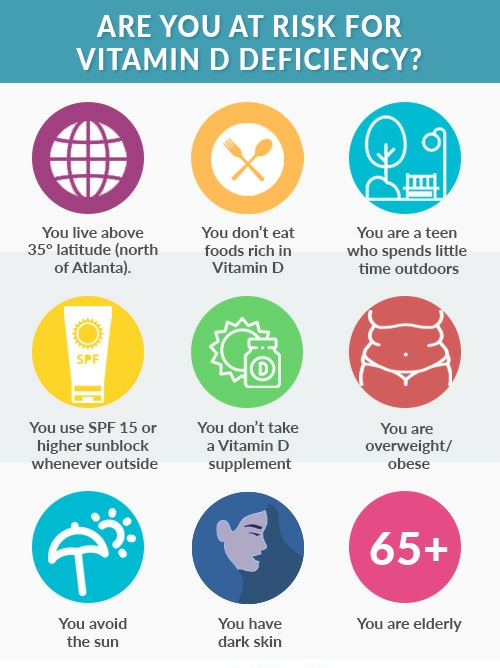
How Do We Get Vitamin D?
Vitamin D is rare in standard human diets, as there are very few natural dietary sources. One major natural source is oily fish (salmon, sardines, etc.), but to get enough vitamin D from oily fish alone, you would need to eat two or more large servings every single day! In some countries, including the United States, it is mandatory to fortify milk with vitamin D.
However, fortified dairy generally contains very low levels of vitamin D.
Some other products can contain added vitamin D but this varies depending on the region and even the food supplier. Mushrooms are one of the few natural plant-based sources of vitamin D, but only when they have been exposed to sunshine (or ultraviolet B). Even then, the amount they contain will be low.
The exposure to sunlight is considered the most efficient way to ensure the body is not deprived of this nutrient.
Sunlight is not just some wavelengths of light hitting our body, it also acts as a signaling molecule and triggers several crucial processes in the body including the synthesis of vitamin D. More than 90% of systemic Vitamin D originates from the skin and around 10% from food intake. When the ultraviolet (UV) light from the sun penetrates human skin, it triggers a chemical reaction that generates vitamin D.
If a person with fair skin goes out in the sun for about 20 minutes wearing a bathing suit, 20,000IU (International Units) of vitamin D can be produced. For comparison, a large fatty piece of fish might contain about 1,000IU. Importantly, persons with darker skin will also generate vitamin D from sun exposure, but not as efficiently due to the fact that darker skin contains more UV blocking melanin. This is a main reason why vitamin D deficiency can be more severe among people of color. People also lose some of their ability to produce vitamin D from sunshine as they age, putting the elderly at a greater risk for deficiency as well.

Should You Supplement Vitamin D?
A vitamin D blood level of around 30ng/ml (75nmol/L) is optimal (the blood test is called 25-hydroxyvitamin D or 25(OH)D). To obtain this blood level, evidence supports moderate and regular sun exposure for most humans. If the sun is strong enough (think Kerley’s rule) exposure every other day for 10-20 minutes of will be sufficient. Darker skin will generally need longer. However, this may not be possible if you live far from the equator and its winter. This also may not be practical if your schedule and lifestyle makes it difficult for you to get outside. In these scenarios, a vitamin D supplement is worth considering.
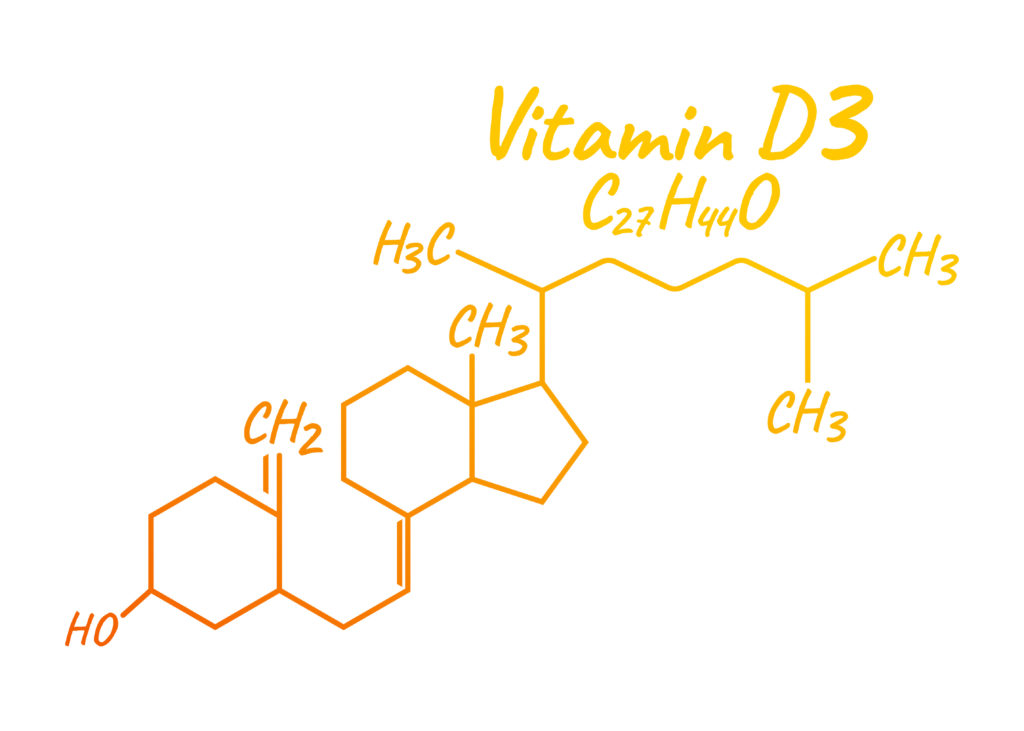
There are two main types of vitamin D: vitamin D2 (generally plant-based) and vitamin D3 (generally derived from sheepskin). Vitamin D3 has been proven to be much more effective than vitamin D2 in both raising blood levels and improving health. It is important to note that until recently, most vitamin D3 supplements were derived from animal sources (sheepskin), but there are now plant-based D3 supplements as well. The plant-based supplements are almost always labeled as such — “plant-based” or “vegan.”
For adults, 2,000IU (50 micrograms) per day is a good starting point, but exact requirements will depend on your body size (larger bodies require more vitamin D) as well as your diet, sun exposure, and genetics. Therefore, it is always a good idea to discuss the best approach with your healthcare practitioner. It is also a good idea to take any vitamin D supplement with food and on a regular basis (e.g. daily) when you can’t get sun (as opposed to large doses from time to time).
Conclusion
5 Facts About Vitamin D
- Vitamin D is not technically a vitamin, it is a precursor to the hormone calcitriol
- Vitamin D is important for bone health and other body functions
- Over 75% of Americans are Vitamin D deficient
- Mushrooms are one of the few natural plant-based sources of vitamin D
- Sunshine is the major source of vitamin D for most humans on the planet
In conclusion, vitamin D is not the cure all some claim. But it is important. Aim for moderate sun exposure when possible and consider vitamin D supplementation when it is not.
Body-Field Scan
Ready to find out what's impacting your energy levels by using our bioenergetic scanning technology. Check out your body’s energy with a Body-Field scan and gain deeper insight into your holographic self with our certified Bioenergetic Practitioner. For an In-Clinic visit click here, or, for a Telehealth (remote) session click here.
We offer a completely new, alternative and bioenergetic healthcare approach based on 21st century science, technology and quantum physics with personalized, holistic therapy solutions such as, our unique BioScalar Infusion℠ therapy, NES body-field scan technology, miHealth biofeedback, PEMF, Rife and Vibroacoustic (VAT) therapies that can restore optimal health and well-being throughout the body, mind and spirit in the most natural way. Let us help you restore your health and energy!


